Vaccinations
Vaccinations help protect your pet against serious infections and diseases. By vaccinating your pet, you are not only helping to keep them healthy, but also preventing the spread of these diseases to other animals and humans. Our experienced veterinarians offer a full health check for your pet at each vaccination. This way, you can be sure that your pet is getting the best possible care.
To make an enquiry about pet vaccinations or microchipping, please get in touch at
07 4773 4111. We send regular reminders for routine vaccinations.
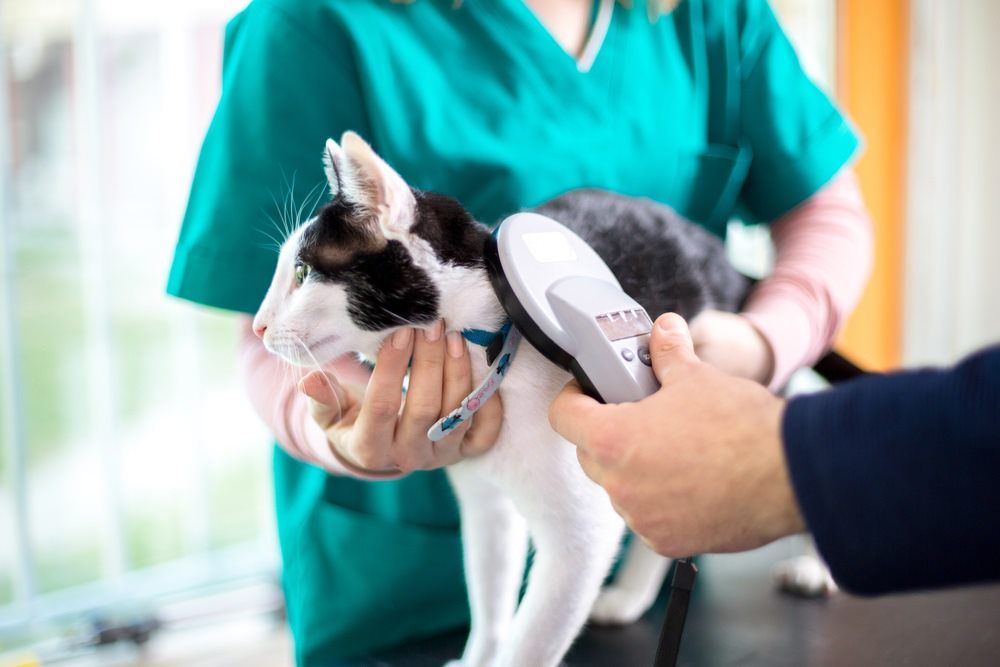
Slide title
Write your caption hereButton
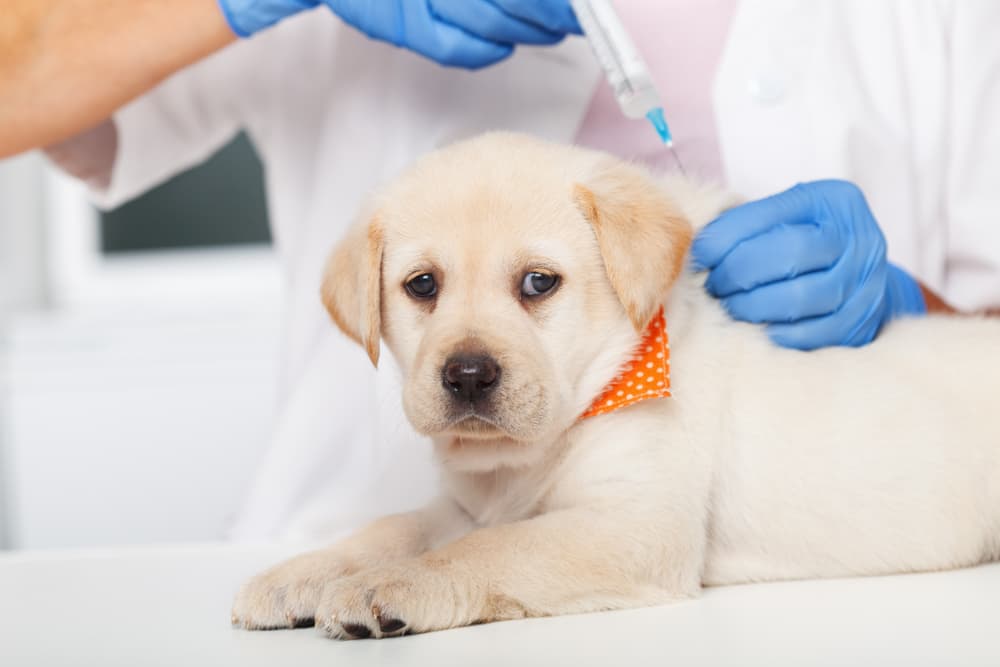 Button
Button
Microchipping
Please be sure that your pets are correctly identified! From time to time, injured pets without identification turn up at vet clinics, brought in by concerned members of the public. If there is no ID, owners cannot be contacted and these animals have to be assumed to be strays.
If a stray is injured a microchip helps us to quickly contact owners so we can agree on a treatment plan straight away. Microchips also save time and worry allowing you to quickly reunite with your pet if they escape from your yard.
Microchipping is quick and easy and only requires a simple injection. The microchip itself is about the size of a grain of rice and is inserted just under the skin, between the shoulder blades. We can enter your pet's microchip number into a national database so that any vet or animal shelter in Australia will be able to identify them if they are ever found. For all enquiries, please contact Western Suburbs Veterinary Clinic.
FAQ's
Vaccinations:
Dogs
-
Is annual vaccination still important?
The simple answer is YES!
The diseases we use core vaccines to prevent are Canine Parvovirus, Distemper and Adenoviral hepatitis. These diseases are usually fatal and the risk of adverse effects from vaccination is very small. Therefore a risk/benefit analysis is very straight-forward!
-
How does immunity work?
The immune system is complex, but essentially there are 3 main mechanisms of resistance to disease.
Innate immunity or inherent resistance, which is unfortunately of little help against these important diseases, even in the best fed healthy animal.
Antibody mediated immunity, induced by exposure to viruses and by vaccination. These antibody levels can be measured in a blood sample, but this is costly and does not provide the whole answer as far as protection level against natural disease is concerned.
Cell mediated immunity which cannot be measured in a blood sample and is a vital defence mechanism induced by vaccination and natural exposure.
-
How do vaccines work?
Vaccination protection has two important aspects.
Protection of the individual – modern vaccines provide excellent protection against parvovirus, distemper and hepatitis in the face of infection challenge.
Herd protection – this is a forgotten aspect of vaccination. Essentially, if more animals in a population are vaccinated, the disease risk is less because the quantity of virus in the environment and number of diseased animals decreases. In fact, if all susceptible individuals are vaccinated the disease risk reduces to nil. Amazingly, smallpox in humans and rinderpest in cattle have been eliminated from the planet by vaccination programs.
Obviously we are never going to get to that utopian state with parvovirus! The reason why some unvaccinated dogs do not get infections is because their owners are relying on herd immunity provided by those responsible owners who do vaccinate!
In human medicine, we are seeing the consequences of decreasing uptake of vaccination – the incidence of measles and whooping cough in some communities is increasing and tragically there have been some infant mortalities from preventable diseases.
-
But what about the risks?
The fact is that some vocal individuals have exaggerated the risk associated with vaccination and seem to have forgotten the fact that these core diseases will kill most infected dogs.
There is always a small risk associated with any mediation or vaccine, but let’s put this in perspective.
The situation in Australia is analogous to that in the UK, where in a 5 year analysis from 2005 to 2010 there were an average of 18 adverse reported reactions per 100,000 doses of vaccine sold. When you consider that many of these reactions are mild lethargy, inappetence or mild swelling at the injection site, it reinforces the fact that vaccination is extremely safe.
-
Annual vaccination?
We still recommend annual vaccination because parvovirus is endemic in Queensland and more recent strains are even more virulent than those we have seen previously. Just recently, I saw a fit, healthy 1 year old cattle dog that died within 24 hours of developing symptoms of parvovirus. This particular dog never left the fenced property so we can only conclude that the virus must have been brought in on shoes, clothing or car tyres.
There is a lack of studies involving extended vaccination interval in the “field” situation (ie real life outside the laboratory) in endemic areas and world experts are still divided on the wisdom of extended interval vaccination.
It is also important that we give a thorough appraisal of your dog’s health status on a yearly basis, as this
provides the opportunity to detect any problems before they become serious and may extend your pet’s life by many years. It is important to ensure that your dog is healthy and likely to have an efficient immune system capable of responding effectively to vaccination.
-
Are puppies more vulnerable?
Yes. Young pups are at a critical stage until 16 weeks of age.
They are born with an immature immune system and have passive immunity which is protection from a temporary supply of antibodies from their mother’s placenta and milk (if mum has been vaccinated!). Vaccination from 6 to 8 weeks of age with 3 vaccines at monthly intervals will give optimum protection during this critical time and enable them to safely meet other pups at puppy preschool and develop social skills.
-
How can I give my dog maximum protection?
We have vast experience in the practical application of vaccines and their impact on animal health, so we
recommend an annual health check and vaccination against the important infectious diseases of dogs.
At the end of the day, we know that what we do is as safe as possible and works!
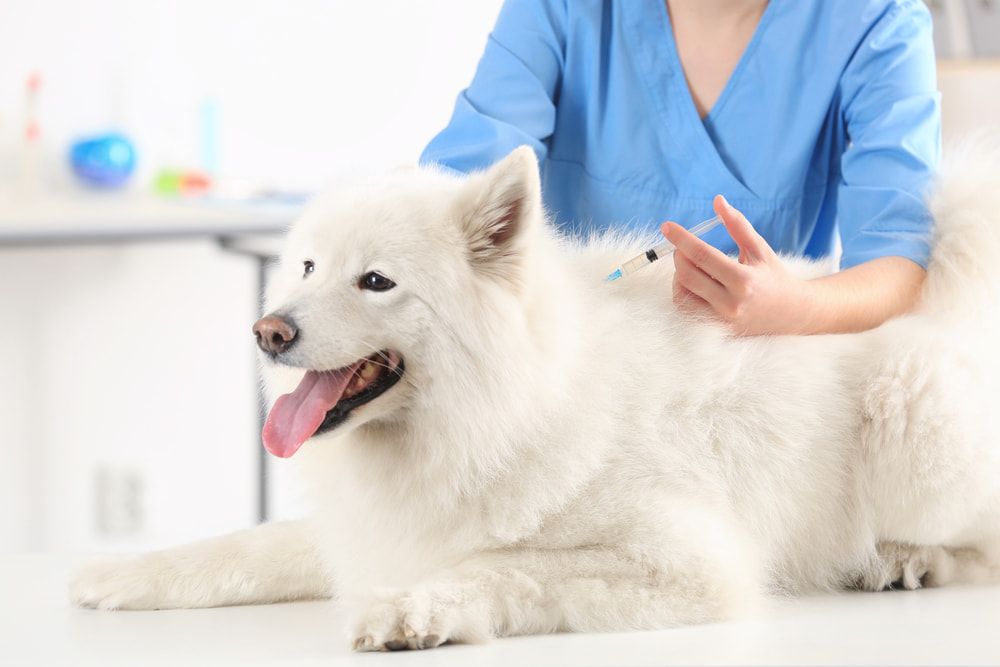 Write your caption hereButton
Write your caption hereButton
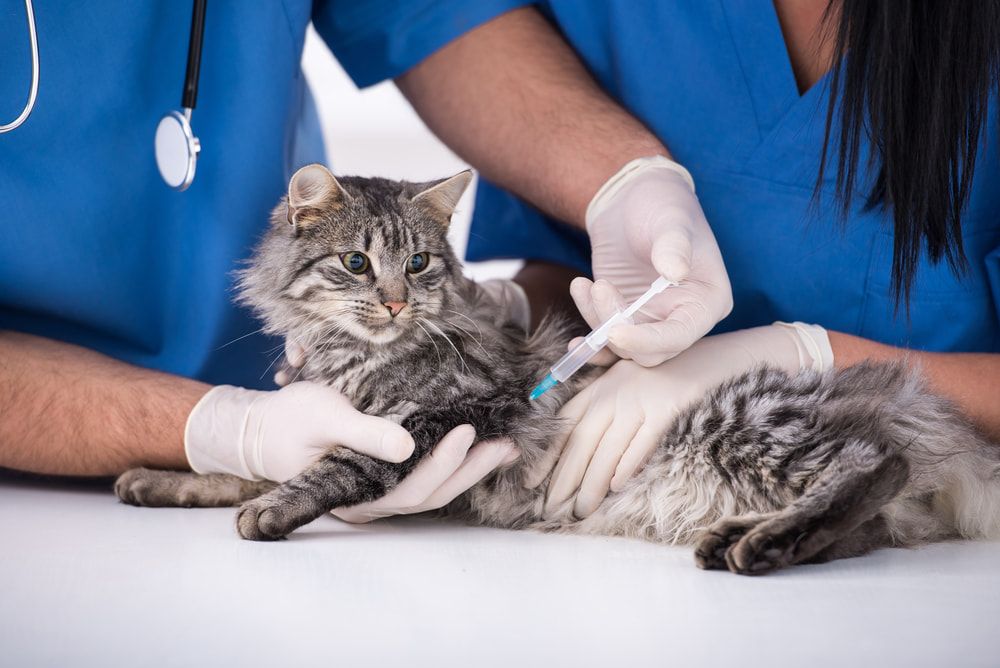 Write your caption hereButton
Write your caption hereButton
Cats
-
Is annual vaccination still important?
The simple answer is YES!
The diseases we use core vaccines to prevent are feline panleucopaenia (Feline Parvovirus ) and the cat flu viruses (Feline Calicivirus and Feline Herpes Virus – 1 ). These diseases can be fatal and are always debilitating. The risk of adverse effects from vaccination is very small. Therefore a risk/benefit analysis is very straight-forward!
-
How does immunity work?
The immune system is complex, but essentially there are 3 main mechanisms of resistance to disease.
Innate immunity or inherent resistance, which is unfortunately of little help against these important diseases, even in the best fed healthy animal.
Antibody mediated immunity, induced by exposure to viruses and by vaccination. These antibody levels can be measured in a blood sample, but this is costly and does not provide the whole answer as far as protection level against natural disease is concerned.
Cell mediated immunity which cannot be measured in a blood sample and is a vital defence mechanism induced by vaccination and natural exposure.
-
How do vaccines work?
Vaccination protection has two important aspects.
Protection of the individual – modern vaccines provide excellent protection against feline parvovirus, and substantially lessen the effects of cat flu, although these flu viruses are impossible to eliminate. Cat viruses are complicated!
Herd protection – this is a forgotten aspect of vaccination. Essentially, if more animals in a population are vaccinated, the disease risk is less because the quantity of virus in the environment and number of diseased animals decreases. In fact, if all susceptible individuals are vaccinated the disease risk reduces to nil. Amazingly, smallpox in humans and rinderpest in cattle have been eliminated from the planet by vaccination programs.
We are never going to get to that utopian state with infectious cat diseases due to their complex biology. The reason why some unvaccinated cats do not get infections is because their owners are relying on herd immunity provided by those responsible owners who do vaccinate!
In human medicine, we are seeing the consequences of decreasing uptake of vaccination – the incidence of measles and whooping cough in some communities is increasing and tragically there have been some infant mortalities from preventable diseases.
-
But what about the risks?
The fact is that some vocal individuals have exaggerated the risk associated with vaccination and seem to have forgotten the fact that these core diseases will cause severe disease in most infected cats.
There is always a small risk associated with any mediation or vaccine, but let’s put this in perspective. The situation in Australia is analogous to that in the UK, where in a 5 year analysis from 2005 to 2010 there were an average of 18 adverse reported reactions per 100,000 doses of vaccine sold.
When you consider that many of these reactions are mild lethargy, inappetence or mild swelling at the injection site, it reinforces the fact that vaccination is extremely safe.
-
Annual vaccination?
We still recommend annual vaccination because cat parvo & flu is endemic in Queensland and more recent strains are even more virulent than those we have seen previously.
There is a lack of studies involving extended vaccination interval in the “field” situation (ie real life outside the laboratory) in endemic areas and world experts are still divided on the wisdom of extended interval vaccination.
It is also important that we give a thorough appraisal of your cat’s health status on a yearly basis, as this provides the opportunity to detect any problems before they become serious and may extend your pet’s life by many years.
It is important to ensure that your cat is healthy and likely to have an efficient immune system capable of responding effectively to vaccination.
-
Are kittens more vulnerable?
Yes. Young kittens are at a critical stage until 16 weeks of age.
They are born with an immature immune system and have passive immunity which is protection from a temporary supply of antibodies from their mother’s placenta and milk (if mum has been vaccinated!). Vaccination from 6 to 8 weeks of age with 3 vaccines at monthly intervals will give optimum protection during this critical time.
-
How can I give my cat maximum protection?
We have vast experience in the practical application of vaccines and their impact on animal health, so we recommend an annual health check and vaccination against the important infectious diseases of cats.
Other infectious diseases such as feline leukaemia (FeLV), feline immunodeficiency ( FIV) & feline coronavirus (FIP) are very complex and advice should be given on an individual animal basis.
At the end of the day, we know that what we do is as safe as possible and works!
Microchipping
-
How is a microchip implanted and is it painful?
The microchip is a tiny implant that is injected under the skin at the base of the scruff of the neck, between the top of the shoulders. The procedure is quick and not usually painful if done correctly, although there can be a brief period of discomfort for very small pets, as the needle bore is larger than those usually used for injections.
-
At what age can my pet be microchipped?
Most puppies and kittens can be implanted from 6-8 weeks. There is no upper age limit. If your pet has not been microchipped yet, then at desexing time this may be a convenient moment, as the pet is anaesthetised and will feel nothing!
-
Can pets other than dogs or cats be microchipped?
Yes – any animal can be microchipped.
-
Are there any complications associated with microchips?
Occasionally a microchip can migrate under the skin. This doesn’t cause clinical problems but makes it harder to locate. Very rarely the body rejects the chip as foreign material and expels it back through the route in which it was implanted. It is quick and easy to check the location of your pet’s microchip at any time.
-
What happens if I move house or relocate my pet?
If your or your animal’s details change it is essential that you notify the microchip registry so that information can be amended. We can assist with this.
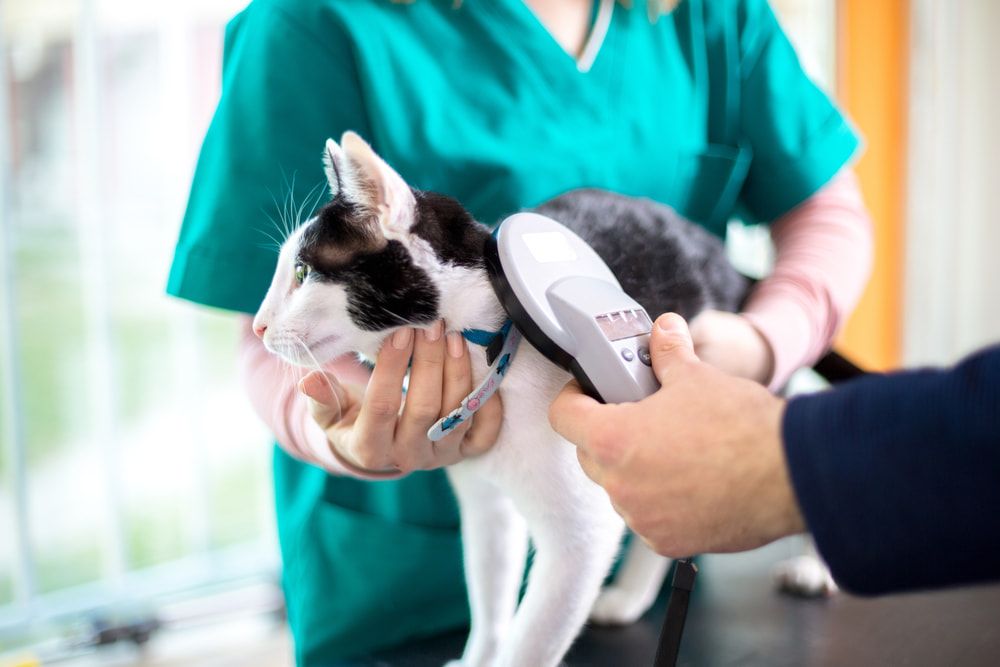 Write your caption hereButton
Write your caption hereButton





